Unit 6 第一课时 Section A (1a-2d)课件【大单元教学】人教版八年级英语下册
文档属性
| 名称 | Unit 6 第一课时 Section A (1a-2d)课件【大单元教学】人教版八年级英语下册 | 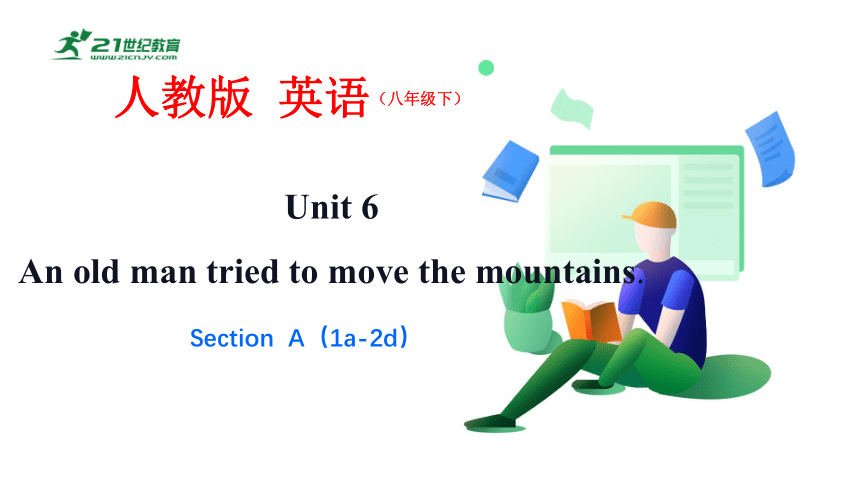 | |
| 格式 | pptx | ||
| 文件大小 | 38.3MB | ||
| 资源类型 | 试卷 | ||
| 版本资源 | 人教新目标(Go for it)版 | ||
| 科目 | 英语 | ||
| 更新时间 | 2024-04-03 21:22:33 | ||
图片预览

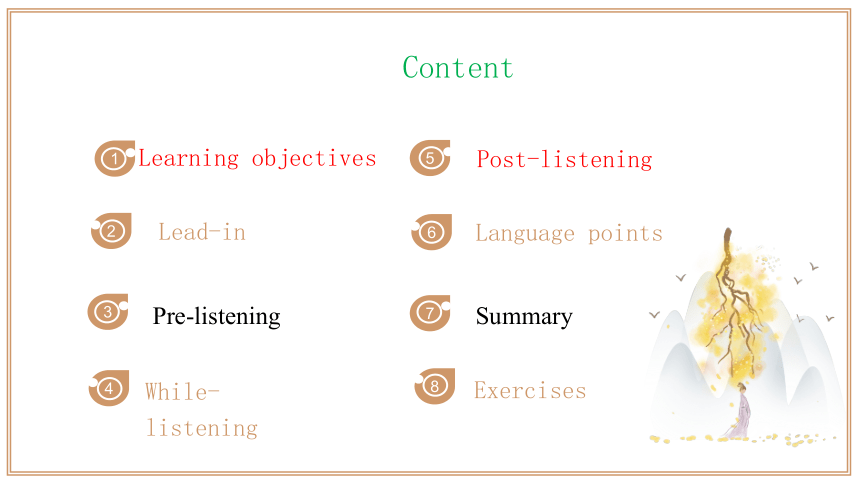
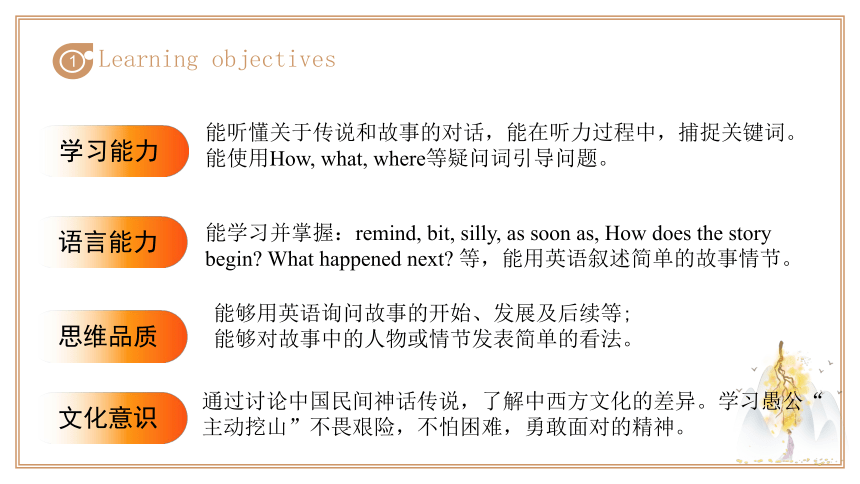
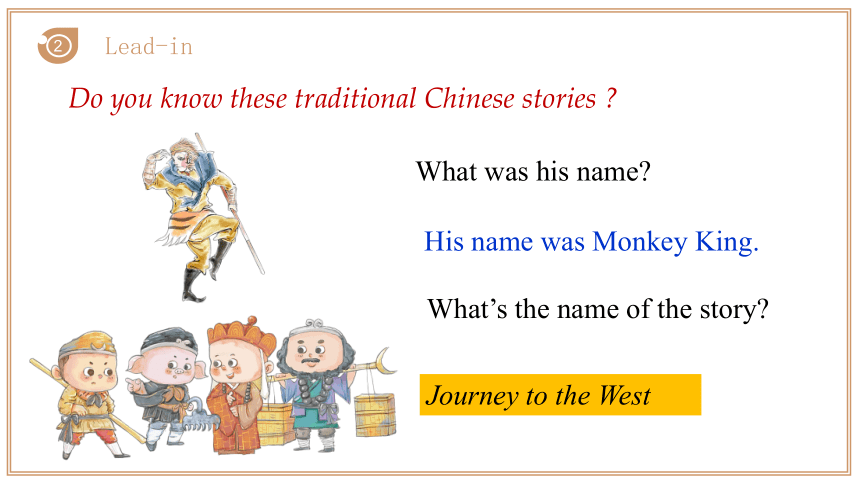
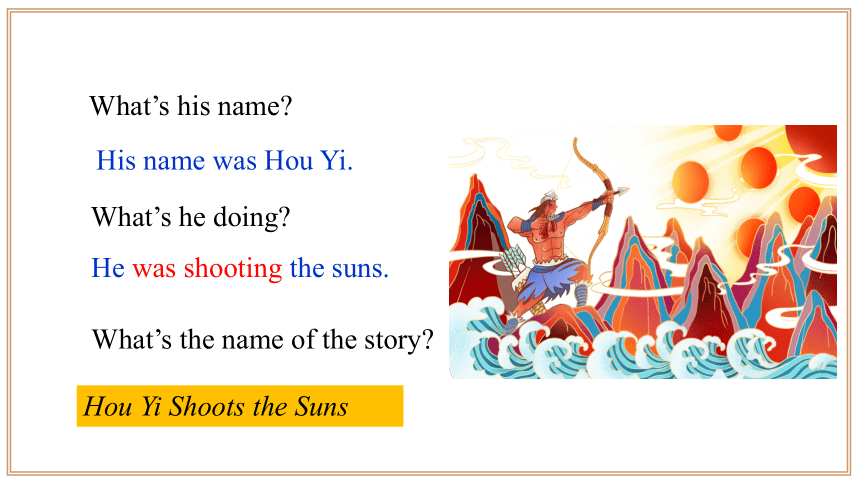
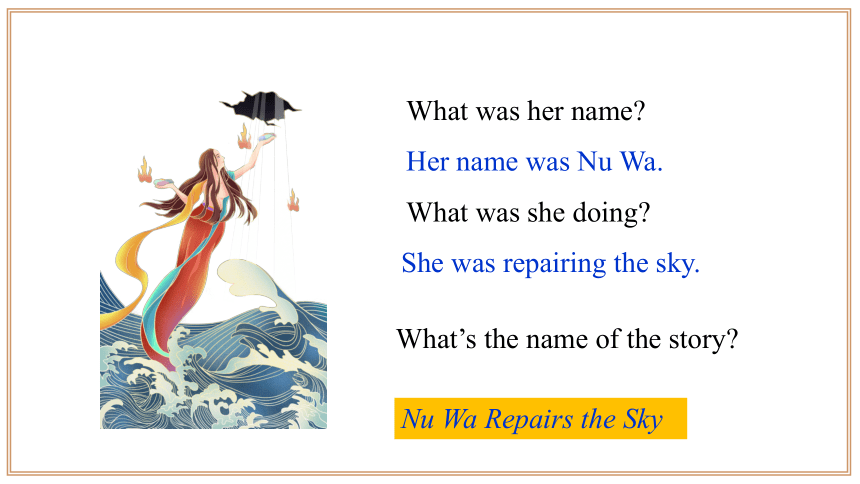
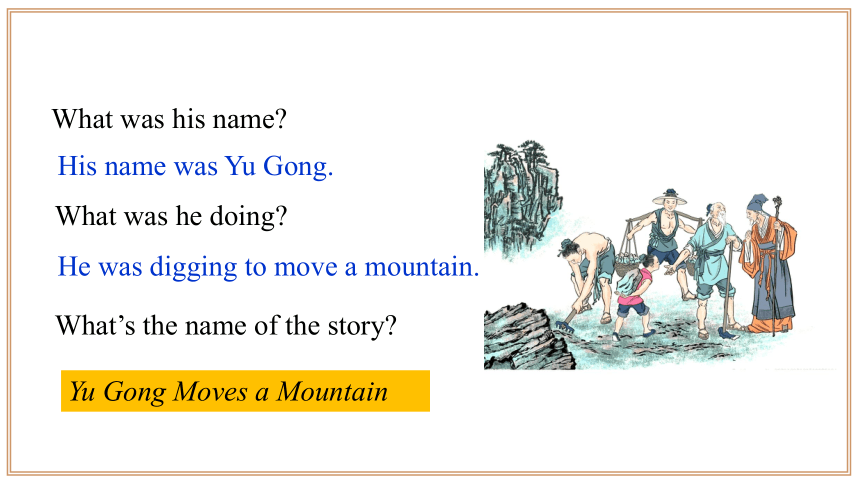
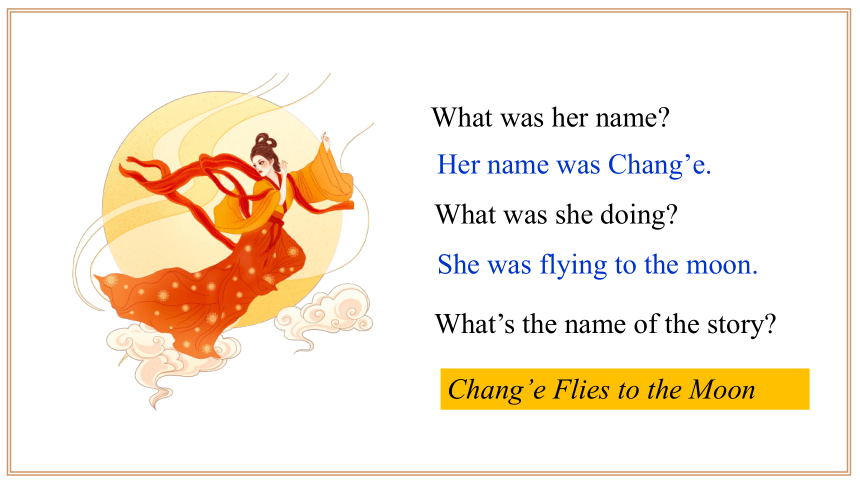
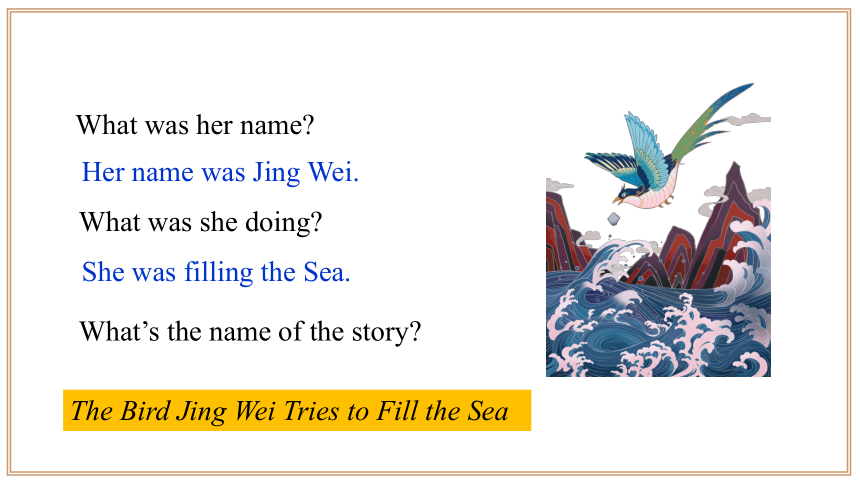
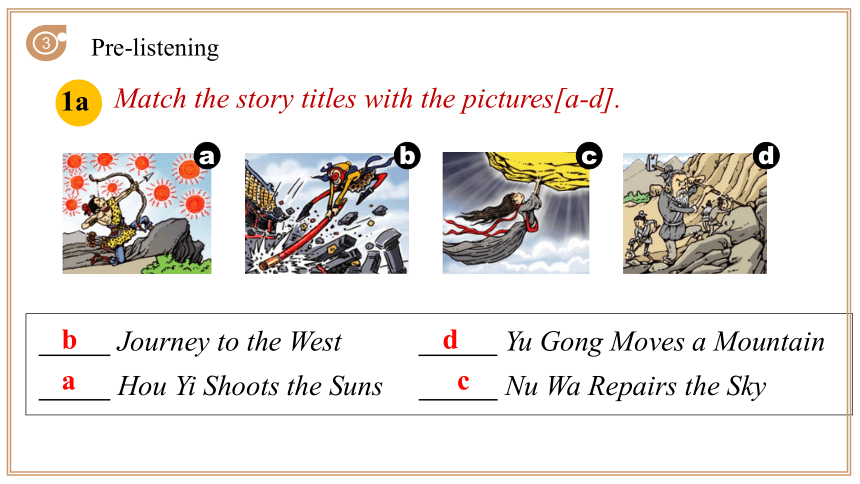

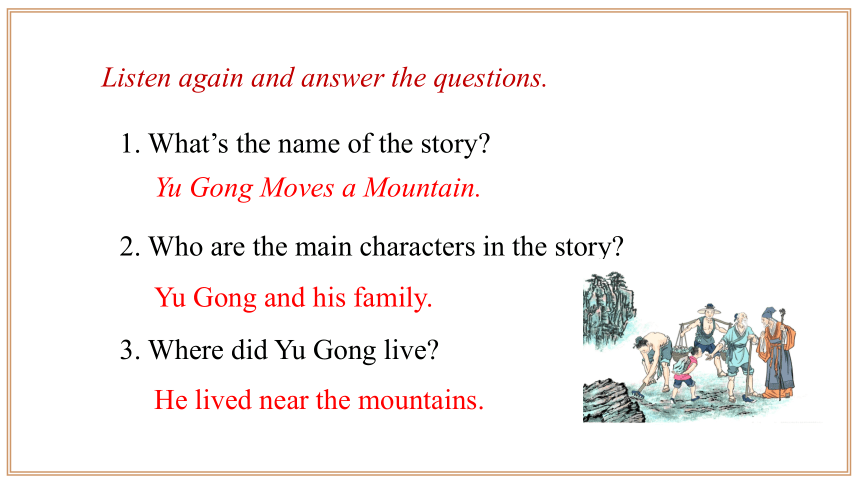
文档简介
(共41张PPT)
人教版 英语(八年级下)
Section A(1a-2d)
Unit 6
An old man tried to move the mountains.
Lead-in
2
Pre-listening
3
While-listening
4
Content
Post-listening
5
Language points
6
Summary
7
Exercises
8
1
Learning objectives
文化意识
语言能力
思维品质
学习能力
1
Learning objectives
能学习并掌握:remind, bit, silly, as soon as, How does the story begin What happened next 等,能用英语叙述简单的故事情节。
能听懂关于传说和故事的对话,能在听力过程中,捕捉关键词。
能使用How, what, where等疑问词引导问题。
能够用英语询问故事的开始、发展及后续等;
能够对故事中的人物或情节发表简单的看法。
通过讨论中国民间神话传说,了解中西方文化的差异。学习愚公“主动挖山”不畏艰险,不怕困难,勇敢面对的精神。
Journey to the West
What was his name
His name was Monkey King.
What’s the name of the story
Do you know these traditional Chinese stories
Lead-in
2
Hou Yi Shoots the Suns
What’s his name
His name was Hou Yi.
What’s he doing
What’s the name of the story
He was shooting the suns.
Nu Wa Repairs the Sky
What was her name
What was she doing
What’s the name of the story
Her name was Nu Wa.
She was repairing the sky.
Yu Gong Moves a Mountain
What was his name
What was he doing
What’s the name of the story
His name was Yu Gong.
He was digging to move a mountain.
Chang’e Flies to the Moon
What was her name
What was she doing
What’s the name of the story
Her name was Chang’e.
She was flying to the moon.
The Bird Jing Wei Tries to Fill the Sea
What was her name
What was she doing
What’s the name of the story
Her name was Jing Wei.
She was filling the Sea.
Match the story titles with the pictures[a-d].
1a
a
b
c
d
Journey to the West Yu Gong Moves a Mountain
Hou Yi Shoots the Suns Nu Wa Repairs the Sky
b
d
a
c
Pre-listening
3
The two mountains are very high and big.
A very old man tried to move the mountains.
A man told Yu Gong that he could never do it.
√
√
Listen and check (√) the facts you hear. Which story are Anna and Wang Ming talking about
1b
_________________________________________________________________________________________
____________________________________________
Anna and Wang Ming are talking about Yu Gong Moves a Mountain.
While-listening
4
1. What’s the name of the story
2. Who are the main characters in the story
3. Where did Yu Gong live
Listen again and answer the questions.
He lived near the mountains.
Yu Gong and his family.
Yu Gong Moves a Mountain.
1c
Discuss the questions with your partner.
1. How does the story begin
Once upon a time, there was a very old man. There were two mountains near his house. They were so big and high that it took a long way to walk to the other side.
Post-listening
5
2. What happened next
The old man told his family that they should
all help him to move the mountains.
3. Where would they put all the earth and
stone from the mountains
Yu Gong said they could put them into the sea because it's big enough to hold everything.
2a
Listen and number the pictures [1-4] in order to tell the story.
4
1
3
2
While-listening
4
Yu Gong and his family began to move some of the _______ and _______ to the _______.
One day, a man told Yu Gong that he could _______ do it because he was _______ and _______. Yu Gong said that his family could ________ to move the mountains after he died.
1
2
earth
stone
sea
never
old
weak
continue
Listen again and fill in the blanks.
So Yu Gong and his family _______ on _______ day after day and year after year.
Finally, a _______ was so moved by Yu Gong that he sent two gods to _______ the mountains _______.
digging
kept
god
away
take
4
3
2b
Listen again and circle the words you hear.
1. A man saw Yu Gong and his (children / family)
when they were working on moving the mountains.
2. He told Yu Gong he could never do it because he
was old and (poor / weak).
3. As soon as the man finished (talking / speaking),
Yu Gong said that his family would continue to
move the mountains after he died.
4. Finally, a god was so moved by Yu Gong that he sent
another (two / three) gods to help take the mountains away.
5. This story reminds us that you can never (know / see)
what’s possible unless you try to make it happen.
how
what
who
where
★How to tell a story
How does the
story begin
What happened next
Who is Yu Gong
Where would they put all the earth and stone
why
Why was Yu Gong trying to move the mountains
2c
Look at the pictures in 2a and tell the story in your own words.
…began to move … to the sea.
Yu Gong and his family began to move some of the earth and stone to the sea.
One day, … saw…working on moving … He told Yu Gong… because …
One day, a man saw Yu Gong and his children when they were working on moving the mountains. He told Yu Gong that he could never do it because he was old and weak.
As soon as…Yu Gong said… continue to move… His family would… but…,
So… kept on…
As soon as the man finished talking, Yu Gong said that his family could continue to move the mountains after he died. His family would live and grow, but the mountains could not get bigger. So Yu Gong and his family kept on digging day after day and year after year.
Finally, …so … by … that … take …away.
Finally, a god was so moved by Yu Gong that he sent two gods to take the mountains away. This story reminds us that you can never know what’s possible unless you try to make it happen.
Role play the conversation.
2d
Teacher: So what do you think about the story of Yu Gong
Wang Ming: I think it's really interesting. Yu Gong found a good
way to solve his problem.
Claudia: Really I think it's a little bit silly. It doesn't seem very
possible to move a mountain.
Wang Ming: But the story is trying to show us that anything is
possible if you work hard! Yu Gong kept trying and
didn't give up.
Claudia: Well, I still don't agree with you. I think we should
try to find other ways to solve a problem.
Wang Ming: But what could Yu Gong do instead of moving the
mountains
Claudia: Well, there are many other ways. For example, he
could build a road. That's better and faster than
moving a mountain!
Teacher: You have different opinions about the story, and
neither of you are wrong. There are many sides to a
story and many ways to understand it.
Read the conversation in 2d and fill in the chart.
Wang Ming’s opinion Claudia’s opinion Teacher’s conclusion
1. really interesting
2. a good way to solve the problem
3. anything is possible if you work hard
1. a little bit silly
2. does not seem very possible to move a mountain
3. try to find other ways to solve a problem
many sides to a story and many ways to understand it
Wang Ming thinks the story of Yu Gong is really interesting. Yu Gong found a good way to __________________. But Claudia thinks it’s _____________. It doesn’t seem very possible to _______________. Wang Ming thinks the story ____________ us that __________________ if you work hard! Yu Gong ___________ and didn’t _______.
solve his problem
a little bit silly
move a mountain
tries to show
anything is possible
kept trying
give up
Fill in the blanks according to the conversation.
However, Claudia thinks Yu Gong could try to other ways _________ moving the mountains. For example, he could ___________. That’s ___________________ moving a mountain! So there are __________ to a story and many ways to understand it.
instead of
build a road
better and faster than
many sides
Summary
7
1.We have done some listening practice, learning how to
talk and listen a story.
2.We have learnt some new words involving this part.
1. He told Yu Gong he could never do it because he was old and weak.
weak在此处意为“虚弱的;无力的”,反义词strong(强壮的)
At the hospital, my body was weak, but my mind was still very clear.
weak adj. 虚弱的;无力的
Language points
6
【拓展延伸】
1. weak还可表示“不擅长的;(能力)弱的;懦弱的”。
be weak in 意为“在……方面差”,相当于 be bad at 。
e.g. Geography is my weak subject.
2. weak的名词形式为weakness,意为“懦弱;衰弱;弱点,缺点”。
e.g. He thought crying was a sign of weakness.
3.weak 还可表示“稀的;稀释的”。
e.g. weak tea/coffee淡茶/淡咖啡
2.This story reminds us that you can never know what’s possible unless you try to make it happen.
remind v. 提醒;使想起
The movie reminds me of my childhood.
My parents often remind me to study hard.
He reminds me that it is necessary to take some money with me.
remind v. 提醒;使想起
remind sb. of / about sth. 提醒某人想起某事
remind sb. to do sth. 提醒某人去做某事
3. I think it’s a little bit silly.
1) a little bit 常用来修饰形容词或副词及其比较级,相当于 a little, a bit 或 kind of 。
It’s a little bit ( = a little / a bit / kind of ) hot today.
You’d better come a little bit earlier tomorrow.
2) a little bit 还可修饰动词。
Could you turn the TV up a little bit
a little bit 有点儿,稍微
【拓展延伸】
1) a little 可直接修饰不可数名词,但是a bit 及a little bit 不可直接修饰名词,需要加of。
He has a little money.=He has a little bit of money.
2) not a little与 not a bit 区别
not a little意为 “很;非常”,not a bit 意为 “一点也不”,相当于not at all。
He is not a bit hungry. 他一点也不饿。
He is not a little hungry. 他非常饿。
silly adj. 愚蠢的;不明事理的
silly作形容词,既可作定语,也可作表语。silly的比较级和最高级分别是sillier和silliest。
That’s a silly question.
I thought it was silly to speak like that.
instead of 代替;反而
4. But what could Yu Gong do instead of moving the mountains
instead 与 instead of 两者都有“代替”的含义,其区别如下:
instead 副词 位于句首或句末,位于句首时常用逗号与后面的内容隔开。
instead of 介词短语 位于句首或句中,后接名词、代词或 v.-ing 形式。
He didn’t reply. Instead, he left the room.
Now in China, more and more people are willing to use Huawei’s products instead of foreign ones.
1. She was _____________ (有点儿) frightened.
2. Life was harder then because n_________ of us had a job.
3. I’m sorry, I’ve forgotten your name. Can you _______ me
4. She was too w______ to stand.
5. Don’t make a move or I’ll ________ (开枪).
6. How can you explain such a ________ (愚蠢的) remark
a little bit
either
remind
eak
shoot
silly
Exercises
8
一、按要求完成句子
修路
有点儿;稍微
两者都不
代替;反而
同意
解决问题
努力工作
放弃
build a road
a little bit
neither of…
instead of
agree with
solve a problem
work hard
give up
二、翻译下面短语
三、翻译下列句子。
1. 你为什么不参加踢足球而只是看热闹?
2. 我的两个哥哥都不能来晚会了。
3. 提醒他打电话给我。
Why don't you play football instead of just looking on
Neither of my brothers could come to the party.
Remind him to call me.
4.这人一说完,愚公就说他死后他的家人会继续移山。
As soon as the man finished speaking, Yu Gong said that his family would continue to move the mountain after he died.
5.这个故事提醒我们,你永远不会知道什么是有可能的,除非你尽
力实现它。
6.愚公找到了一个解决他的问题的好办法。
7.我认为这有点愚蠢。
8.移山似乎是不太可能的。
This story reminds us that you can never know what is possible unless you try to make it happen.
Yu Gong found a good way to solve his problem.
I think it’s a little bit silly.
It doesn’t seem very possible to move a mountain.
人教版 英语(八年级下)
Section A(1a-2d)
Unit 6
An old man tried to move the mountains.
Lead-in
2
Pre-listening
3
While-listening
4
Content
Post-listening
5
Language points
6
Summary
7
Exercises
8
1
Learning objectives
文化意识
语言能力
思维品质
学习能力
1
Learning objectives
能学习并掌握:remind, bit, silly, as soon as, How does the story begin What happened next 等,能用英语叙述简单的故事情节。
能听懂关于传说和故事的对话,能在听力过程中,捕捉关键词。
能使用How, what, where等疑问词引导问题。
能够用英语询问故事的开始、发展及后续等;
能够对故事中的人物或情节发表简单的看法。
通过讨论中国民间神话传说,了解中西方文化的差异。学习愚公“主动挖山”不畏艰险,不怕困难,勇敢面对的精神。
Journey to the West
What was his name
His name was Monkey King.
What’s the name of the story
Do you know these traditional Chinese stories
Lead-in
2
Hou Yi Shoots the Suns
What’s his name
His name was Hou Yi.
What’s he doing
What’s the name of the story
He was shooting the suns.
Nu Wa Repairs the Sky
What was her name
What was she doing
What’s the name of the story
Her name was Nu Wa.
She was repairing the sky.
Yu Gong Moves a Mountain
What was his name
What was he doing
What’s the name of the story
His name was Yu Gong.
He was digging to move a mountain.
Chang’e Flies to the Moon
What was her name
What was she doing
What’s the name of the story
Her name was Chang’e.
She was flying to the moon.
The Bird Jing Wei Tries to Fill the Sea
What was her name
What was she doing
What’s the name of the story
Her name was Jing Wei.
She was filling the Sea.
Match the story titles with the pictures[a-d].
1a
a
b
c
d
Journey to the West Yu Gong Moves a Mountain
Hou Yi Shoots the Suns Nu Wa Repairs the Sky
b
d
a
c
Pre-listening
3
The two mountains are very high and big.
A very old man tried to move the mountains.
A man told Yu Gong that he could never do it.
√
√
Listen and check (√) the facts you hear. Which story are Anna and Wang Ming talking about
1b
_________________________________________________________________________________________
____________________________________________
Anna and Wang Ming are talking about Yu Gong Moves a Mountain.
While-listening
4
1. What’s the name of the story
2. Who are the main characters in the story
3. Where did Yu Gong live
Listen again and answer the questions.
He lived near the mountains.
Yu Gong and his family.
Yu Gong Moves a Mountain.
1c
Discuss the questions with your partner.
1. How does the story begin
Once upon a time, there was a very old man. There were two mountains near his house. They were so big and high that it took a long way to walk to the other side.
Post-listening
5
2. What happened next
The old man told his family that they should
all help him to move the mountains.
3. Where would they put all the earth and
stone from the mountains
Yu Gong said they could put them into the sea because it's big enough to hold everything.
2a
Listen and number the pictures [1-4] in order to tell the story.
4
1
3
2
While-listening
4
Yu Gong and his family began to move some of the _______ and _______ to the _______.
One day, a man told Yu Gong that he could _______ do it because he was _______ and _______. Yu Gong said that his family could ________ to move the mountains after he died.
1
2
earth
stone
sea
never
old
weak
continue
Listen again and fill in the blanks.
So Yu Gong and his family _______ on _______ day after day and year after year.
Finally, a _______ was so moved by Yu Gong that he sent two gods to _______ the mountains _______.
digging
kept
god
away
take
4
3
2b
Listen again and circle the words you hear.
1. A man saw Yu Gong and his (children / family)
when they were working on moving the mountains.
2. He told Yu Gong he could never do it because he
was old and (poor / weak).
3. As soon as the man finished (talking / speaking),
Yu Gong said that his family would continue to
move the mountains after he died.
4. Finally, a god was so moved by Yu Gong that he sent
another (two / three) gods to help take the mountains away.
5. This story reminds us that you can never (know / see)
what’s possible unless you try to make it happen.
how
what
who
where
★How to tell a story
How does the
story begin
What happened next
Who is Yu Gong
Where would they put all the earth and stone
why
Why was Yu Gong trying to move the mountains
2c
Look at the pictures in 2a and tell the story in your own words.
…began to move … to the sea.
Yu Gong and his family began to move some of the earth and stone to the sea.
One day, … saw…working on moving … He told Yu Gong… because …
One day, a man saw Yu Gong and his children when they were working on moving the mountains. He told Yu Gong that he could never do it because he was old and weak.
As soon as…Yu Gong said… continue to move… His family would… but…,
So… kept on…
As soon as the man finished talking, Yu Gong said that his family could continue to move the mountains after he died. His family would live and grow, but the mountains could not get bigger. So Yu Gong and his family kept on digging day after day and year after year.
Finally, …so … by … that … take …away.
Finally, a god was so moved by Yu Gong that he sent two gods to take the mountains away. This story reminds us that you can never know what’s possible unless you try to make it happen.
Role play the conversation.
2d
Teacher: So what do you think about the story of Yu Gong
Wang Ming: I think it's really interesting. Yu Gong found a good
way to solve his problem.
Claudia: Really I think it's a little bit silly. It doesn't seem very
possible to move a mountain.
Wang Ming: But the story is trying to show us that anything is
possible if you work hard! Yu Gong kept trying and
didn't give up.
Claudia: Well, I still don't agree with you. I think we should
try to find other ways to solve a problem.
Wang Ming: But what could Yu Gong do instead of moving the
mountains
Claudia: Well, there are many other ways. For example, he
could build a road. That's better and faster than
moving a mountain!
Teacher: You have different opinions about the story, and
neither of you are wrong. There are many sides to a
story and many ways to understand it.
Read the conversation in 2d and fill in the chart.
Wang Ming’s opinion Claudia’s opinion Teacher’s conclusion
1. really interesting
2. a good way to solve the problem
3. anything is possible if you work hard
1. a little bit silly
2. does not seem very possible to move a mountain
3. try to find other ways to solve a problem
many sides to a story and many ways to understand it
Wang Ming thinks the story of Yu Gong is really interesting. Yu Gong found a good way to __________________. But Claudia thinks it’s _____________. It doesn’t seem very possible to _______________. Wang Ming thinks the story ____________ us that __________________ if you work hard! Yu Gong ___________ and didn’t _______.
solve his problem
a little bit silly
move a mountain
tries to show
anything is possible
kept trying
give up
Fill in the blanks according to the conversation.
However, Claudia thinks Yu Gong could try to other ways _________ moving the mountains. For example, he could ___________. That’s ___________________ moving a mountain! So there are __________ to a story and many ways to understand it.
instead of
build a road
better and faster than
many sides
Summary
7
1.We have done some listening practice, learning how to
talk and listen a story.
2.We have learnt some new words involving this part.
1. He told Yu Gong he could never do it because he was old and weak.
weak在此处意为“虚弱的;无力的”,反义词strong(强壮的)
At the hospital, my body was weak, but my mind was still very clear.
weak adj. 虚弱的;无力的
Language points
6
【拓展延伸】
1. weak还可表示“不擅长的;(能力)弱的;懦弱的”。
be weak in 意为“在……方面差”,相当于 be bad at 。
e.g. Geography is my weak subject.
2. weak的名词形式为weakness,意为“懦弱;衰弱;弱点,缺点”。
e.g. He thought crying was a sign of weakness.
3.weak 还可表示“稀的;稀释的”。
e.g. weak tea/coffee淡茶/淡咖啡
2.This story reminds us that you can never know what’s possible unless you try to make it happen.
remind v. 提醒;使想起
The movie reminds me of my childhood.
My parents often remind me to study hard.
He reminds me that it is necessary to take some money with me.
remind v. 提醒;使想起
remind sb. of / about sth. 提醒某人想起某事
remind sb. to do sth. 提醒某人去做某事
3. I think it’s a little bit silly.
1) a little bit 常用来修饰形容词或副词及其比较级,相当于 a little, a bit 或 kind of 。
It’s a little bit ( = a little / a bit / kind of ) hot today.
You’d better come a little bit earlier tomorrow.
2) a little bit 还可修饰动词。
Could you turn the TV up a little bit
a little bit 有点儿,稍微
【拓展延伸】
1) a little 可直接修饰不可数名词,但是a bit 及a little bit 不可直接修饰名词,需要加of。
He has a little money.=He has a little bit of money.
2) not a little与 not a bit 区别
not a little意为 “很;非常”,not a bit 意为 “一点也不”,相当于not at all。
He is not a bit hungry. 他一点也不饿。
He is not a little hungry. 他非常饿。
silly adj. 愚蠢的;不明事理的
silly作形容词,既可作定语,也可作表语。silly的比较级和最高级分别是sillier和silliest。
That’s a silly question.
I thought it was silly to speak like that.
instead of 代替;反而
4. But what could Yu Gong do instead of moving the mountains
instead 与 instead of 两者都有“代替”的含义,其区别如下:
instead 副词 位于句首或句末,位于句首时常用逗号与后面的内容隔开。
instead of 介词短语 位于句首或句中,后接名词、代词或 v.-ing 形式。
He didn’t reply. Instead, he left the room.
Now in China, more and more people are willing to use Huawei’s products instead of foreign ones.
1. She was _____________ (有点儿) frightened.
2. Life was harder then because n_________ of us had a job.
3. I’m sorry, I’ve forgotten your name. Can you _______ me
4. She was too w______ to stand.
5. Don’t make a move or I’ll ________ (开枪).
6. How can you explain such a ________ (愚蠢的) remark
a little bit
either
remind
eak
shoot
silly
Exercises
8
一、按要求完成句子
修路
有点儿;稍微
两者都不
代替;反而
同意
解决问题
努力工作
放弃
build a road
a little bit
neither of…
instead of
agree with
solve a problem
work hard
give up
二、翻译下面短语
三、翻译下列句子。
1. 你为什么不参加踢足球而只是看热闹?
2. 我的两个哥哥都不能来晚会了。
3. 提醒他打电话给我。
Why don't you play football instead of just looking on
Neither of my brothers could come to the party.
Remind him to call me.
4.这人一说完,愚公就说他死后他的家人会继续移山。
As soon as the man finished speaking, Yu Gong said that his family would continue to move the mountain after he died.
5.这个故事提醒我们,你永远不会知道什么是有可能的,除非你尽
力实现它。
6.愚公找到了一个解决他的问题的好办法。
7.我认为这有点愚蠢。
8.移山似乎是不太可能的。
This story reminds us that you can never know what is possible unless you try to make it happen.
Yu Gong found a good way to solve his problem.
I think it’s a little bit silly.
It doesn’t seem very possible to move a mountain.
同课章节目录
- Unit 1 What's the matter?
- Section A
- Section B
- Unit 2 I'll help to clean up the city parks.
- Section A
- Section B
- Unit 3 Could you please clean your room?
- Section A
- Section B
- Unit 4 Why don't you talk to your parents?
- Section A
- Section B
- Unit 5 What were you doing when the rainstorm came
- Section A
- Section B
- Review of Units 1-5
- Unit 6 An old man tried to move the mountains.
- Section A
- Section B
- Unit 7 What's the highest mountain in the world?
- Section A
- Section B
- Unit 8 Have you read Treasure Island yet?
- Section A
- Section B
- Unit 9 Have you ever been to a museum?
- Section A
- Section B
- Unit 10 I've had this bike for three years.
- Section A
- Section B
